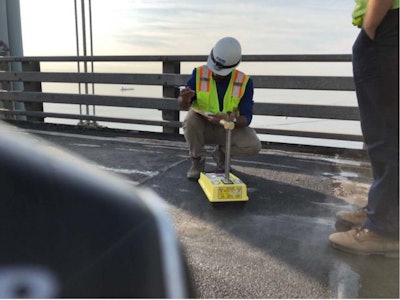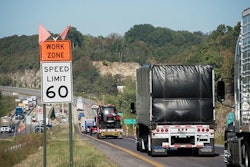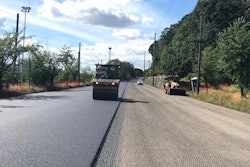
If your company works on large highway projects, you may be familiar with the third party infrastructure inspection process. Outside firms are hired to complete a detailed audit of a project to ensure that the people, equipment and procedures used on a project are compliant and to specification.
If the asphalt contractor on the job has followed their quality control plan correctly, these independent companies will simply document their findings to provide quality assurance to the project owner.
"Infrastructure inspection are required by some entities that have jurisdiction over some public-oriented areas that serve the public, like parks, highways, bridges and road," Andrew Szulczewski, P.E. technical director at Atlas Engineering & Inspection Services (AEIS) says. "These inspections provide a good account for the serviceability of the structures and installations and provide project officials with a level of confidence that the work has been done correctly and the structure will serve the public for the long-term."
During construction, these inspectors will be present on the project to complete multiple tasks and report their findings back to the project owners.
"We're evaluating the density of the sub-grade and then when asphalt comes, we also do the same with density checks and also checking that material quality complies with the specifications," Szulczewski says. "We're going through the construction stages making sure that materials used are approved and they have good quality and installations are also good quality and final specifications are met by installations."
What Happens During Inspections
The inspection services of most specifications require a variety of tests to be performed in the asphalt plant facility during batching. Field inspection and testing is followed to monitor the correct trucks arrived with the proper material, if a tack coat is required that it is used with application to a proper flow, temperature is again monitored to verify the temperature at time of placement is maintained, compaction methods are monitored and compaction is tested with either the use of a density gauge and/or cores. Some specifications also have requirements to verify thickness of pavements, surface elevation and surface smoothness (either with rolling straightedge or with a profilograph).
"AEIS will provide an inspector at the asphalt batch plant to perform a series of quality tests that would be performed on the asphalt material being placed in the field," Szulczewski says. "For every truck, the load will be monitored for quantity and temperature before the truck leaves the facility. Every asphalt design mix allows a range of test data per test for an optimum placement; and temperature is critical. If any test result is out of range, the asphalt plant manager will be notified as well as the field site if the truck is still dispatched to the site regardless of results."
Gradation is tested of the aggregate stockpile. Asphalt plugs are made from sample material taken from random trucks and the plugs are tested per specification which typically includes but not limited to the following:
- C content
- Air voids
- VMA
- Voids Filled
- Flow
- Stability
Each of the test results will have a range the results are required to be within (range can typically be found in the project specifications and/or approved design mix) and each of the results will provide information of how the asphalt will perform.
With respect to field inspection, most specifications require asphalt cores to be taken after the material is compacted and the cores are tested to verify:
- percent compaction
- percent air voids
- thickness of compacted asphalt material in place
"We have a lab in which we test the materials that are that are sampled, either in form of loose asphalt in the boxes or cores taken," Szulczewski says. "We test material for ignition density, gradation and Marshall tests."
Last year, AEIS provided over 75 inspections for roadways.
Resolving Issues
If there are issues found during the inspection, the project manager are immediately notified.
"We provide the facts for the job" Szulczewski says. "We do not jump into deciding or finding the best course of action to remedy the issue. We leave that in the hands of the engineer or the plant quality manager to resolve the problem with materials or with existing site conditions."
Infrastructure inspectors give a detailed report of their findings to the project owners once construction is complete which is when bonuses - or penalties - can then be determined.
"It's important for project owners to understand that the frequency of tests that were required by specifications were complete and if there is anything in non-compliance workers are usually penalized in the form of either monetary penalty or told that the work has to be re-done," Szulczewski says. Everyone on the job understands how how critical this is and they know it is very important for them to make sure they pass the tests.
"This is why our tests are usually a secondary test because the installer of asphalt or base course have already done the tests themselves. They have their own inspector as well so we are basically doing the oversight of vigilance because they know before that it's ready. They already detected that it is. That's why we usually have very few discrepancies and non-compliance issues on big projects."
Still, these third party inspections are very important for all parties involved on a project.
"It is very important for project managers to understand the full spectrum of stages and phases of the contract," Szulczewski says. "Certain things done before could impact severely the final outcome of the project. Some cases of negligence known or unknown, intended or unintended, will play a role later that may or may not become a big price to pay. So, they the important importance here is about people communicating properly on a manager's level, all the way down to the foreman and knowing the facts and presenting the true facts so there is a level of level of confidence on these projects. When there is this fairness, the outcome is usually good for everyone involved."




















